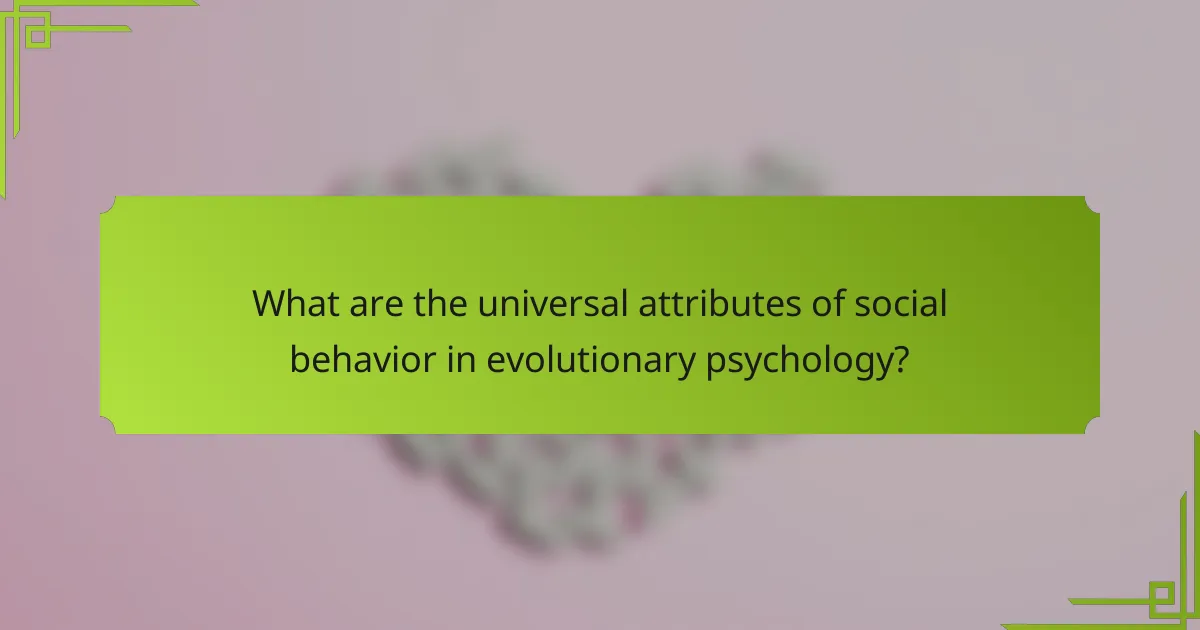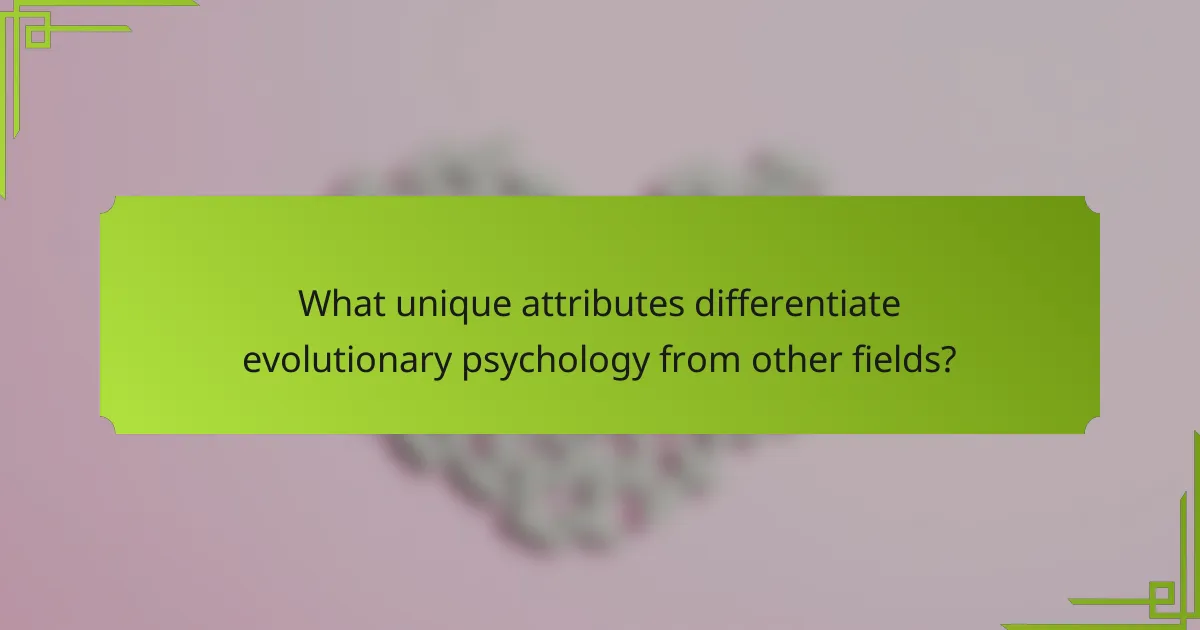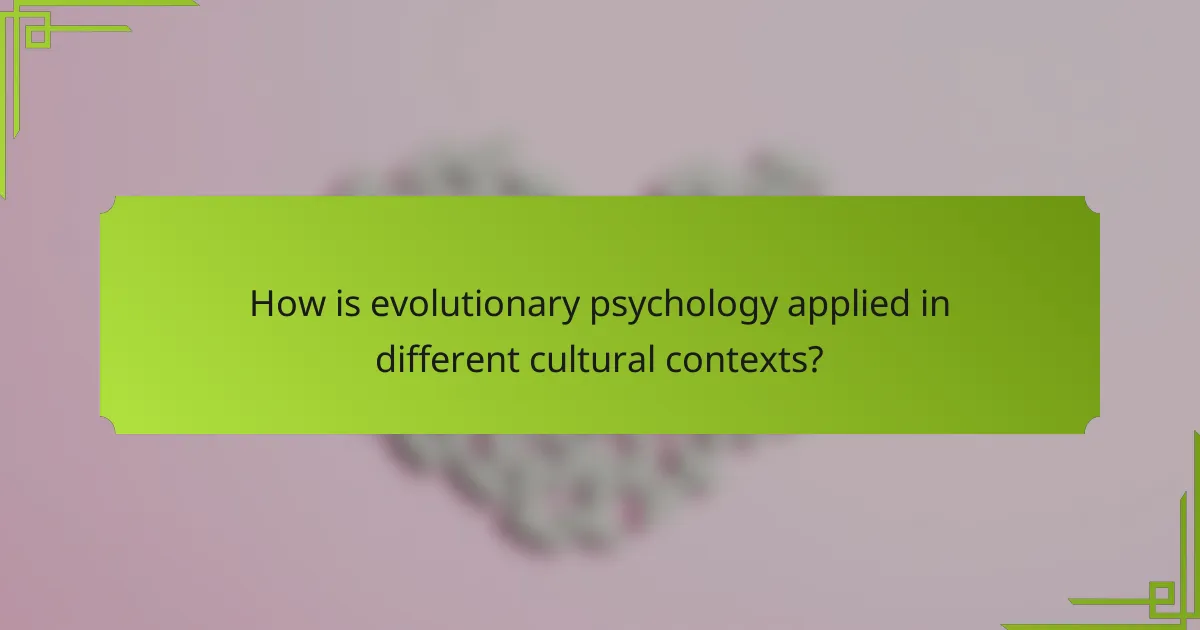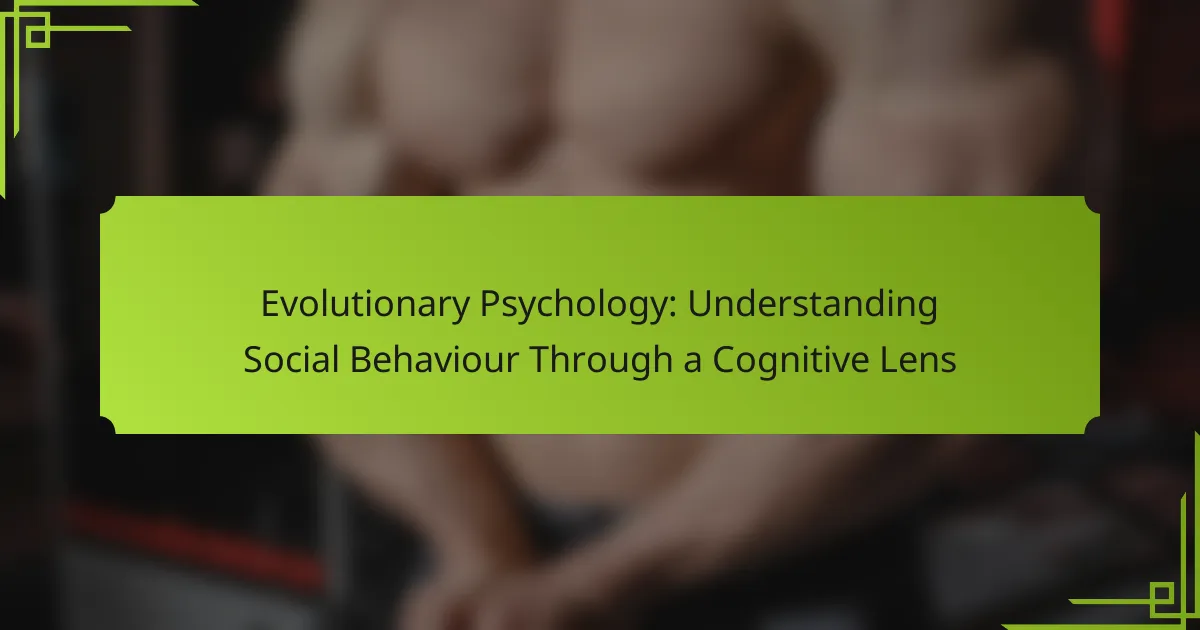Understanding social behavior is crucial for navigating complex human interactions. Evolutionary psychology examines how evolutionary processes shape traits like cooperation, competition, and altruism. It integrates biology with psychology to reveal the adaptive functions of behavior. This article explores the influence of ancestral environments, cultural contexts, and practical implications for modern social dynamics.

What is the foundation of evolutionary psychology?
The foundation of evolutionary psychology lies in the premise that human behavior and cognition are shaped by evolutionary processes. This discipline explores how traits and social behaviors have developed to enhance survival and reproduction. Key attributes include the influence of natural selection on psychological traits, the role of ancestral environments in shaping modern behavior, and the examination of innate predispositions. Evolutionary psychology seeks to explain social behaviors through cognitive frameworks, emphasizing the interplay between biology and environment in human interactions.
How does evolutionary psychology explain social behavior?
Evolutionary psychology explains social behavior as a product of adaptive traits shaped by natural selection. These behaviors enhance survival and reproductive success. For instance, cooperation and altruism may arise from kin selection, promoting the survival of shared genes. Additionally, social hierarchies reflect evolutionary strategies for resource allocation and mating opportunities. Understanding these patterns reveals the cognitive mechanisms underlying human interactions and societal structures.
What are the core principles of evolutionary psychology?
Evolutionary psychology is grounded in the principles of natural selection and adaptation. It examines how human behaviors and cognitive processes have evolved to solve problems related to survival and reproduction. Key principles include the emphasis on innate psychological mechanisms, the role of environment in shaping behavior, and the understanding of social behaviors as adaptations. These principles provide insights into human motivations, mating strategies, and group dynamics, illustrating how our evolutionary past influences contemporary social interactions.

What are the universal attributes of social behavior in evolutionary psychology?
Universal attributes of social behavior in evolutionary psychology include cooperation, competition, altruism, and social bonding. These traits evolved to enhance survival and reproductive success. Cooperation fosters group cohesion, while competition drives resource acquisition. Altruism promotes group welfare, often at personal cost, and social bonding strengthens relationships, facilitating mutual support. Understanding these attributes reveals how human behavior is shaped by evolutionary pressures.
How do innate behaviors influence social interactions?
Innate behaviors significantly shape social interactions by guiding instinctual responses. These behaviors, such as aggression, attachment, and cooperation, enhance group cohesion and communication. For instance, attachment behaviors promote nurturing relationships, fostering social bonds essential for survival. Additionally, aggression can establish social hierarchies, influencing group dynamics. Understanding these innate behaviors reveals their evolutionary significance in forming complex social structures.
What role does natural selection play in shaping social behavior?
Natural selection significantly influences social behavior by favoring traits that enhance survival and reproduction. It shapes behaviors like cooperation and altruism, which can improve group cohesion and resource sharing. These adaptations often arise from the need to navigate complex social environments. For example, individuals exhibiting prosocial behaviors may gain more allies, enhancing their reproductive success. Understanding these dynamics provides insight into the evolutionary basis of human interactions.
How do cognitive biases affect social behavior?
Cognitive biases significantly influence social behavior by shaping perceptions and decision-making processes. These biases, rooted in evolutionary psychology, help individuals navigate complex social environments but can lead to irrational judgments. For instance, the confirmation bias leads people to favor information that supports their existing beliefs, impacting group dynamics and interpersonal relationships. Additionally, social proof bias causes individuals to conform to the actions of others, often overlooking personal judgment. Understanding these biases reveals how they affect trust, cooperation, and conflict in social settings.

What unique attributes differentiate evolutionary psychology from other fields?
Evolutionary psychology is distinguished by its focus on the adaptive functions of behavior and cognition. Unlike other fields, it emphasizes how evolutionary processes shape mental functions and social behaviors. This perspective integrates biology with psychology, providing insights into the origins of human behavior. A unique attribute is its reliance on evolutionary theory to explain psychological phenomena, which sets it apart from traditional psychology that may not consider evolutionary factors. Additionally, it explores universal human behaviors, such as mating strategies and parenting, often through a cross-cultural lens, revealing patterns that transcend individual societies.
How does evolutionary psychology integrate biology and psychology?
Evolutionary psychology integrates biology and psychology by examining how evolutionary processes shape human behavior and cognition. This field emphasizes the adaptive functions of psychological traits, suggesting that many behaviors are rooted in survival and reproduction strategies. For instance, social behaviors like cooperation and competition can be understood through the lens of natural selection, highlighting the biological basis for psychological phenomena. This interdisciplinary approach allows for a richer understanding of human behavior by linking genetic predispositions with psychological outcomes.
What are the unique theories proposed by prominent evolutionary psychologists?
Prominent evolutionary psychologists propose several unique theories that explain social behavior through evolutionary principles. One key theory is the Adaptationist Framework, which suggests that many human behaviors evolved as adaptations to environmental challenges. Another significant theory is the Parental Investment Theory, emphasizing that reproductive strategies differ between genders, influencing mating behaviors. The Social Brain Hypothesis posits that the complexity of human social interactions drove the evolution of larger brains. Lastly, the Theory of Mind highlights the ability to attribute mental states to oneself and others, which is crucial for social cognition and cooperation.

What rare attributes are observed in evolutionary psychology?
Evolutionary psychology exhibits rare attributes such as the influence of ancestral environments on modern behavior, the interplay of genetic predispositions with cultural factors, and the unique cognitive biases shaped by evolutionary pressures. These attributes highlight the complexity of human social behavior through a cognitive lens.
What are uncommon social behaviors explained by evolutionary psychology?
Uncommon social behaviors explained by evolutionary psychology include altruism, social grooming, and status signaling. These behaviors enhance group cohesion and survival, reflecting innate human tendencies shaped by evolutionary pressures. Altruism, for example, fosters cooperation among individuals, increasing overall fitness. Social grooming strengthens relationships, while status signaling communicates dominance or resources, influencing social hierarchies. Understanding these behaviors provides insight into human interactions and societal structures.
How do cultural variations influence evolutionary psychology perspectives?
Cultural variations significantly shape evolutionary psychology perspectives by influencing social behaviors and cognitive processes. Different cultures prioritize distinct values, which affect mate selection, parenting styles, and group dynamics. For example, collectivist cultures may emphasize group harmony, leading to cooperative behaviors, while individualistic cultures may focus on personal achievement, fostering competition. These variations highlight the unique attributes of social structures across cultures, revealing how environmental factors can shape psychological mechanisms. Understanding these influences enhances the comprehension of human behavior through an evolutionary lens.

How is evolutionary psychology applied in different cultural contexts?
Evolutionary psychology is applied in various cultural contexts to understand social behavior. It examines how evolutionary principles shape cultural norms and values, influencing interpersonal relationships and social structures.
For instance, in collectivist cultures, evolutionary psychology highlights the importance of group cohesion and cooperation, as these traits enhance survival. Conversely, in individualistic cultures, it focuses on personal achievement and autonomy, reflecting different adaptive strategies.
Research shows that cultural practices, such as marriage customs and parenting styles, are influenced by evolutionary pressures. These practices vary significantly across societies, illustrating the unique adaptations that arise from specific environmental and social conditions.
Overall, evolutionary psychology provides insights into the diverse ways human behavior is shaped by both biological imperatives and cultural contexts.
What insights does evolutionary psychology offer for conflict resolution?
Evolutionary psychology provides insights into conflict resolution by highlighting innate human behaviors shaped by survival needs. Understanding these behaviors can facilitate empathy and cooperation during disputes.
One key insight is the concept of kin selection, which suggests individuals prioritize resolving conflicts within their social groups to enhance group cohesion. This can lead to more effective communication strategies that focus on shared goals and mutual benefits.
Another important aspect is the role of emotions in conflict. Evolutionary psychology posits that emotions like anger or fear are evolutionary responses that can escalate conflicts. Recognizing these emotional triggers allows individuals to approach conflicts more rationally, minimizing destructive outcomes.
Additionally, evolutionary psychology emphasizes the importance of social norms and reciprocity in conflict resolution. Individuals are more likely to resolve conflicts when they perceive fairness and equity, which fosters trust and collaboration.
How can evolutionary psychology inform modern relationship dynamics?
Evolutionary psychology provides insights into modern relationship dynamics by highlighting innate human behaviors shaped by survival and reproduction. Understanding these behaviors helps individuals navigate attraction, mate selection, and conflict resolution. For instance, research indicates that evolutionary factors influence preferences for physical traits and social status. This perspective can enhance communication and empathy, fostering healthier relationships. Additionally, recognizing evolutionary influences aids in addressing issues like jealousy or attachment styles, ultimately promoting more fulfilling connections.

What are the practical implications of evolutionary psychology?
Evolutionary psychology offers practical implications by enhancing our understanding of social behavior, decision-making, and interpersonal relationships. It suggests that many behaviors are rooted in evolutionary adaptations, influencing modern human interactions. For example, insights from evolutionary psychology can inform approaches in education, therapy, and conflict resolution by recognizing underlying motives shaped by ancestral environments. As a result, practitioners can tailor strategies that align with innate human tendencies, improving effectiveness in various social contexts.
What best practices can be derived from evolutionary psychology for improving social interactions?
Evolutionary psychology offers several best practices for enhancing social interactions. Understanding innate social behaviors can improve communication and relationship-building.
Firstly, recognizing the role of non-verbal cues is essential. Body language, facial expressions, and tone of voice significantly influence social exchanges. Being aware of these signals can enhance empathy and connection.
Secondly, fostering cooperation and reciprocity is vital. Evolutionary psychology highlights that humans are predisposed to work together for mutual benefit. Encouraging collaborative efforts can strengthen social bonds.
Lastly, embracing diversity in social groups can lead to richer interactions. Exposure to different perspectives fosters adaptability and creativity, enhancing problem-solving and relationship dynamics.
What common mistakes should be avoided when applying evolutionary psychology principles?
Avoiding common mistakes in applying evolutionary psychology principles is crucial for accurate interpretations. Key mistakes include oversimplifying complex behaviors, neglecting cultural contexts, and misapplying evolutionary concepts to justify modern social issues. These errors can lead to misunderstandings of human behavior and social dynamics. Additionally, failing to consider the interplay between biology and environment can result in incomplete analyses. Recognizing these pitfalls enhances the application of evolutionary psychology in understanding social behavior.
How can understanding evolutionary psychology enhance personal development?
Understanding evolutionary psychology enhances personal development by providing insights into human behavior and motivations. This knowledge helps individuals identify patterns in their actions and relationships, fostering self-awareness.
By recognizing innate tendencies shaped by evolution, one can address personal challenges more effectively. For example, understanding the need for social connection can improve interpersonal skills.
Additionally, evolutionary psychology emphasizes the role of adaptive traits, encouraging individuals to cultivate strengths that align with their natural inclinations. This alignment can lead to more fulfilling life choices and personal growth.
Ultimately, applying principles from evolutionary psychology promotes a deeper understanding of oneself and enhances the ability to navigate social dynamics.
